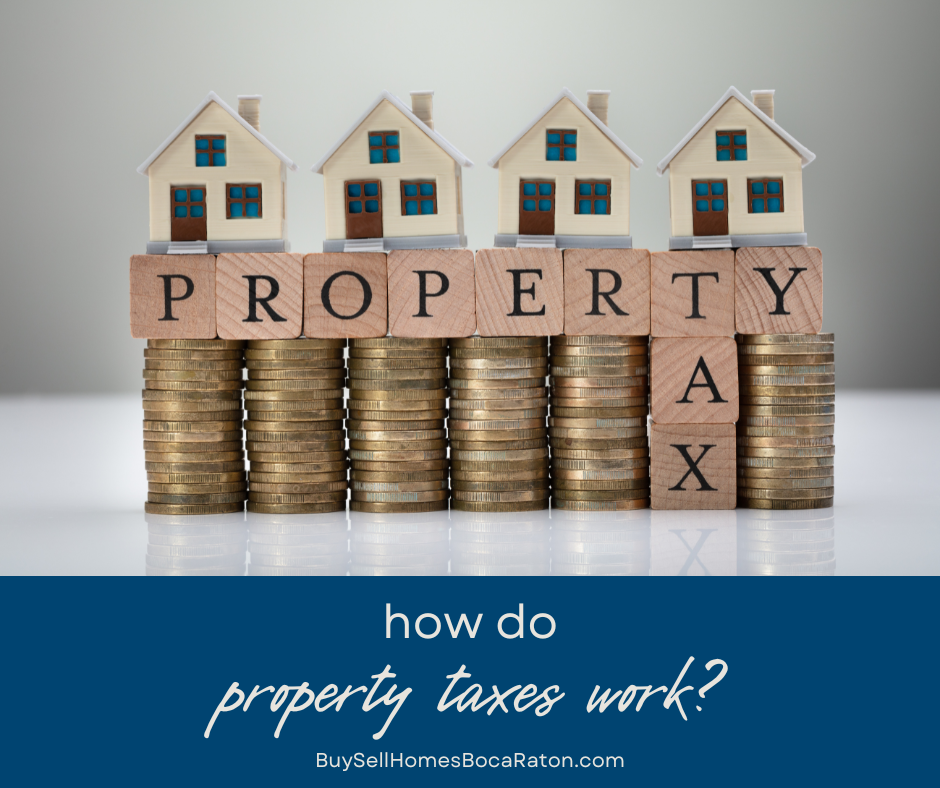Property taxes are a crucial part of homeownership and funding for local government services. Understanding how property taxes work can help you better manage your finances and anticipate annual costs.
How Do Property Taxes Work?
Property taxes are based on the value of real estate and are used to fund various local government services. This guide explains the following:
- Property tax assessment
- Determining property tax rates
- Calculating your property tax bill
- Exemptions and reductions
- Paying your property taxes
- Appeals process for property tax assessment
Here’s a closer look at each.
Property Tax Assessment
The first step in determining property taxes is the assessment of your property’s value. Local government assessors evaluate properties periodically to establish their market value. The assessment considers various factors such as:
- The size and features of the property
- Location and neighborhood characteristics
- Recent sales of similar properties
- Improvements or changes to the property
In some areas, assessments are done annually, while in others, they might occur every few years. The assessed value is a critical component in calculating your property tax bill.
Related: Pet-friendly home-buying information
Determining Property Tax Rates
Property tax rates, also known as mill rates or millage rates, are determined by local governments. These rates are based on the amount of revenue needed to fund public services such as schools, roads, police, and fire departments. The rate is typically expressed in mills, where one mill represents one-tenth of one cent. For example, a rate of 20 mills means $20 of tax for every $1,000 of assessed property value.
Calculating Your Property Tax Bill
To calculate your property tax bill, follow these steps:
- Determine the Assessed Value: Find out the assessed value of your property from your local assessor’s office.
- Identify the Tax Rate: Obtain the current property tax rate for your area from the local tax authority.
- Calculate the Tax: Multiply the assessed value of your property by the tax rate and divide by 1,000 (if the rate is in mills).
For example, if your property is assessed at $200,000 and the tax rate is 25 mills, your property tax would be calculated as follows:
200,000×25/1,000 = $5,000.
Exemptions and Reductions
Many areas offer property tax exemptions and reductions for eligible homeowners. Common exemptions include:
- Homestead Exemption: Reduces the taxable value of a primary residence.
- Senior Citizen Exemption: Offers reductions for homeowners over a certain age.
- Veterans Exemption: Provides tax relief for military veterans.
- Disability Exemption: Reduces taxes for homeowners with disabilities.
Check with your local tax authority to see which exemptions you might qualify for and how to apply.
Related: Pet-friendly interior design
Paying Your Property Taxes
Property taxes are usually paid annually or semi-annually. Homeowners receive a tax bill detailing the amount owed and the due date. You can pay property taxes directly to the local tax collector’s office or through an escrow account managed by your mortgage lender. Failure to pay property taxes can result in penalties, interest charges, and potentially a lien on your property.
Appeals Process for Property Tax Assessment
If you believe your property’s assessed value is too high, you can appeal the assessment. The appeals process typically involves:
- Reviewing the Assessment: Obtain a copy of the assessment and review the details.
- Gathering Evidence: Collect evidence that supports a lower valuation, such as recent sales of comparable properties or an independent appraisal.
- Filing an Appeal: Submit a formal appeal to the local assessor’s office within the specified timeframe.
- Attending a Hearing: Present your case at a hearing, where the assessment board will review your evidence and make a decision.
Successful appeals can result in a reduced assessed value and lower property taxes.
FAQ About Property Taxes
Check out these commonly asked questions about property taxes. If you don’t see your question here, please call our office and we’ll find you the answers you need.
What Factors Affect My Property Tax Bill?
Factors include the assessed value of your property, the local tax rate, and any applicable exemptions or reductions.
How Often Are Property Assessments Conducted?
Assessment frequency varies by location, with some areas conducting assessments annually and others every few years.
Can I Reduce My Property Tax Bill?
Yes, you can reduce your bill through exemptions, reductions, and successfully appealing your property’s assessed value.
What Happens If I Don’t Pay My Property Taxes?
Failure to pay property taxes can result in penalties, interest charges, and a lien on your property, potentially leading to foreclosure.
How Do I Find Out My Property’s Assessed Value?
Contact your local assessor’s office or check their website for information on your property’s assessed value and recent assessments.
Understanding how property taxes work can help you manage your finances and ensure you’re not overpaying. By knowing the assessment process, tax rates, and available exemptions, you can navigate the property tax system more effectively. If you have questions or need assistance, consulting a knowledgeable real estate agent or tax professional can provide valuable guidance.
Are You Buying or Selling a Home in Boca Raton?
Ready to sell your home quickly and at the right price? Find out how much your home is worth now!
If you’re looking for a new home in Boca Raton, Boynton Beach, Delray Beach or Highland Beach, we can help. Use these popular one-click searches to find what you’re looking for:
- Boca Raton homes for sale
- Delray Beach homes for sale
- Highland Beach homes for sale
- Pet-friendly 55+ communities in Delray Beach
- Over-55 communities in Delray Beach
- Boca Raton gated communities
- Pet-friendly 55+ communities in Boca Raton
Get Instant Access to Hot New Listings by Filling Out the Form Below


